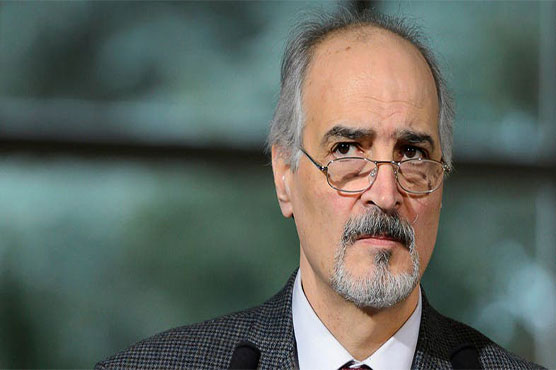Syria says Idlib ceasefire depends on Turkey

Syria said the success of a ceasefire in Idlib depends on Turkey disarming rebels of heavy weapons.
NUR-SULTAN (AFP) - Syria Friday said the success of a ceasefire in its northwestern region of Idlib depends on Turkey disarming rebels of heavy weapons and implementing a buffer zone.
Syrian negotiator Bashar Jaafari, speaking at peace talks in Kazakhstan, attacked the Turkish military presence in the area and called Syria s ceasefire statement on Thursday "a test of Turkey s intentions".
The comments came during the second day of talks brokered by Syria s allies Russia and Iran, along with rebel-backer Turkey.
Jaafari also called on the guarantors of the talks to assume "their responsiblities by putting pressure on Turkey" to fulfil the conditions of an accord struck last year.
"The ceasefire agreement is conditioned on Turkey upholding the Astana and Sochi agreements by disarming terrorists of heavy and medium weapons," Jaafari said.
Jaafari also accused the militant groups of shelling areas under Damascus control in northwest Syria "from areas Turkey controls in Idlib."
"Even though we are patient, this time our patience will be limited. We will not be waiting endlessly for Turkey to fulfil its commitments," he said.
Syria state news agency SANA reported Thursday that the government had agreed to a truce in Idlib on condition a Turkish-Russian buffer-zone deal is implemented.
It cited a military source who announced the regime s "approval for a ceasefire in the de-escalation zone in Idlib starting from tonight" on the condition that jihadists and rebels withdraw from a buffer zone as per a September accord.
Moscow welcomed the statement.
Idlib is the last major jihadist-run bastion in Syria after eight years of brutal conflict.
Idlib and parts of the neighbouring provinces of Aleppo, Hama and Latakia are under the control of Hayat Tahrir al-Sham, a jihadist group led by Syria s former Al-Qaeda affiliate.
Speaking in Nur-Sultan on Friday the Kremlin s chief negotiator on Syria, Alexander Lavrentyev called on the moderate opposition to distance itself from radical groups in the region.
"We have appealed to the moderate opposition to do everything possible not to have any contacts or agreements with these militants," he said.
The Idlib region is supposed to be protected from a massive government offensive by the September buffer zone deal but it has come under increasing bombardment by the regime and its Russian ally over the past three months.
Lavrentyev said he expected that militant groups operating there would continue to offer fierce resistance.
A joint statement on the talks in Kazakhstan s capital Nur-Sultan released by Russia, Iran and Turkey showed little progress towards ending Syria s conflict.
Moscow is seen as driving the talks in the Kazakh capital which has now seen 13 rounds of negotiations since the beginning of 2017.
Lavrentyev stressed a number of humanitarian issues addressed by the two-day talks and expressed hope a desert camp for displaced persons near the Jordanian border would be closed this month.
According to the UN, around 25,000 people remained in the isolated Rukban camp near the Al-Tanf base used by the US-led coalition fighting the Islamic State group, after over 17,000 left between March and July 21.
This round of talks in Nur-Sultan were the first attended by observer delegations from neighbouring Jordan and Syria.
The war in Syria has killed more than 370,000 people and displaced millions since it started in 2011 with a crackdown on anti-government protests.

